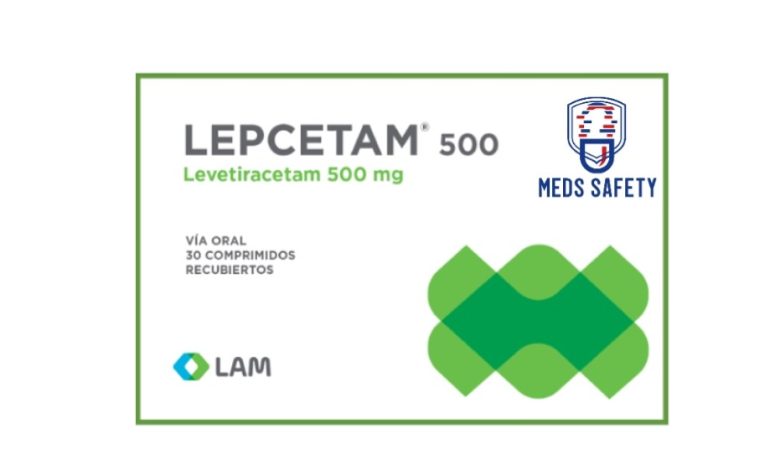Lepcetam Tablets 500mg: Uses, Dosage, Benefits Side Effects, Interactions

What is Lepcetam?
Lepcetam is a brand of Levetiracetam 500mg, it is an antiepileptic drug used to treat seizures, specifically as adjunctive therapy in the treatment of partial-onset seizures, myoclonic seizures, and primary generalized tonic-clonic seizures in adults and children. It belongs to a class of medications known as anticonvulsants.
Lepcetam is a commonly prescribed medication but its usage can vary depending on factors such as the country, region, and the specific patient population being considered. This medication is frequently chosen as a first-line treatment option for certain types of seizures. Its effectiveness, favorable side effect profile, and ease of use (including once-daily dosing options) make it a preferred choice for many healthcare providers.
How it works
Lepcetam works by affecting the transmission of nerve signals in the brain. Although its exact mechanism of action is not fully understood, it is believed to work by binding to a protein called synaptic vesicle protein 2A (SV2A) in the brain. SV2A is involved in the release of neurotransmitters, which are chemicals that transmit signals between nerve cells.
By binding to SV2A, Lepcetam modulates neurotransmitter release, particularly the release of a neurotransmitter called glutamate. Glutamate is involved in the spread of seizure activity in the brain. By reducing the release of glutamate, Lepcetam helps to stabilize and prevent excessive electrical activity in the brain, thereby reducing the likelihood of seizures.
It’s important to note that the exact mechanism of action of Lepcetam and its effects on brain function are still being researched, and there may be other factors involved in its antiepileptic properties.
Lepcetam Dosage
The dosage of Lepcetam can vary depending on several factors, including the individual’s age, weight, medical condition, and response to treatment. It is important to follow the dosage instructions provided by your healthcare professional or the specific instructions on the medication label.
Typically, Lepcetam is available as a 500mg tablets. The prescribed dosage may be different for adults and children.
For adults and adolescents (16 years and older) with epilepsy, the usual starting dose of Lepcetam is 1000 mg per day, divided into two equal doses (500 mg twice a day). The dosage may be increased as needed, based on the individual’s response and tolerability, up to a maximum recommended dose of 3000 mg per day (divided into two or three doses).
For children aged 6 to 15 years with epilepsy, the starting dose is usually lower, typically around 20 mg per kilogram of body weight per day, divided into two equal doses. The dosage may be increased as necessary, up to a maximum of 60 mg per kilogram per day.
It’s important to remember that the specific dosage and treatment plan should be determined by a healthcare professional who is familiar with your medical history and condition. They will consider various factors to determine the appropriate dosage for you or your child. Always follow their instructions and do not make any changes to your medication regimen without consulting them first.
Can a Pregnant woman take Lepcetam 500mg tablets?
Yes, but pregnant women should always consult their healthcare provider before taking any medications, including Lepcetam or any other antiepileptic drug. The safety of using Lepcetam during pregnancy has not been definitively established, and it is essential to weigh the potential benefits against the potential risks to both the mother and the developing fetus.
Several factors are taken into consideration when determining the use of antiepileptic medications during pregnancy, including the severity of the mother’s epilepsy, the frequency and severity of seizures, and the potential risks associated with untreated seizures. Additionally, other factors such as the gestational age, overall health, and individual circumstances of the pregnant woman are also considered.
It is important to discuss your specific situation with a healthcare professional, preferably a neurologist or an obstetrician who specializes in managing epilepsy in pregnancy. They can evaluate the potential risks and benefits and provide you with personalized advice and recommendations based on your medical history.
Abruptly stopping or changing antiepileptic medication during pregnancy can also carry risks, as uncontrolled seizures can be harmful to both the mother and the baby. Therefore, it is crucial to seek medical guidance and not make any decisions regarding medication adjustments without proper medical supervision.
Can a breastfeeding woman take Lepcetam 500mg tablets?
Yes, levetiracetam, the active ingredient in Lepcetam 500mg tablets, does pass into breast milk, but the amount that passes is relatively low. The decision to take Lepcetam while breastfeeding should be made in consultation with a healthcare professional who can evaluate the potential risks and benefits for both the mother and the baby.
In general, most sources suggest that levetiracetam is considered compatible with breastfeeding due to the low levels found in breast milk and the limited reports of adverse effects in breastfed infants. However, individual circumstances and factors such as the dose of Lepcetam, the age and health of the infant, and any other medications or medical conditions should be taken into account.
It is important to discuss your specific situation with your healthcare provider, who can provide you with personalized advice and recommendations. They can consider the potential risks and benefits and help you make an informed decision regarding the use of Lepcetam while breastfeeding.
They may monitor the infant for any potential side effects, such as drowsiness or irritability, and adjust the dosage or medication regimen as necessary. Additionally, they may recommend closely monitoring the infant’s growth and development.
Lepcetam side effects
Lepcetam may cause certain side effects in some individuals. It’s important to note that not everyone will experience these side effects, and the severity and frequency of side effects can vary. Common side effects of Lepcetam include:
1. Drowsiness: Some individuals may experience drowsiness or sedation, particularly when starting the medication or when the dosage is increased.
2. Dizziness: Lepcetam can cause dizziness or a feeling of lightheadedness, which may affect coordination and balance.
3. Fatigue: Feelings of tiredness or fatigue may occur in some individuals.
4. Headache: Headaches are a common side effect reported with Lepcetam use.
5. Irritability or mood changes: Some individuals may experience irritability, mood swings, or changes in behavior.
6. Nausea or vomiting: Lepcetam may cause gastrointestinal symptoms such as nausea or vomiting.
7. Infection: There have been rare reports of an increased risk of infections, such as urinary tract infections or respiratory infections, in individuals taking Lepcetam.
8. Skin reactions: Rarely, Lepcetam may cause skin reactions, such as rash or hives.
9. Behavioral and psychiatric effects: In rare cases, Lepcetam has been associated with psychiatric symptoms, including aggression, agitation, anxiety, depression, or suicidal thoughts. It’s important to seek medical attention if any significant changes in mood or behavior occur.
It’s important to report any side effects to your healthcare provider. They can provide guidance on managing side effects and determine if any adjustments to the medication regimen are necessary.
Please note that this is not an exhaustive list of side effects, and other rare or severe side effects may occur. Always consult your healthcare provider or pharmacist for a comprehensive list of potential side effects associated with Lepcetam.
Lepcetam interactions
Lepcetam may interact with other medications or substances, which can affect its effectiveness or increase the risk of side effects. It’s important to inform your healthcare provider about all the medications, supplements, and herbal products you are taking before starting Lepcetam. Here are some known interactions:
1. Other antiepileptic drugs: Lepcetam may interact with other antiepileptic medications, potentially affecting their blood levels or increasing the risk of side effects. Your healthcare provider will carefully manage the combination of medications to ensure effectiveness and minimize interactions.
2. Central nervous system depressants: Lepcetam may enhance the sedative effects of other medications that depress the central nervous system, such as sedatives, tranquilizers, or alcohol. Combining Lepcetam with these substances can increase drowsiness and impair coordination.
3. Birth control pills: Lepcetam does not appear to affect the effectiveness of hormonal contraceptives, such as birth control pills. However, it is always recommended to discuss contraceptive options with your healthcare provider to ensure the most appropriate method for you.
4. Drugs metabolized by the kidneys: Lepcetam is primarily eliminated from the body through the kidneys. Medications that are also eliminated by the kidneys may interact with Lepcetam and affect its clearance from the body. Your healthcare provider may adjust the dosage of these medications if necessary.
5. Probenecid: Probenecid, a medication used to treat gout, may increase the blood levels of Lepcetam by reducing its elimination from the body. Your healthcare provider may need to adjust the dosage of Lepcetam if you are taking probenecid.
6. Drug-drug interactions: Lepcetam has a low potential for drug-drug interactions compared to other antiepileptic drugs. However, it is always important to consult your healthcare provider or pharmacist to review your medication profile and identify any potential interactions.
These are not all the possible interactions of Lepcetam. It’s crucial to disclose all your medications to your healthcare provider and follow their guidance to ensure the safe and effective use of Lepcetam.





